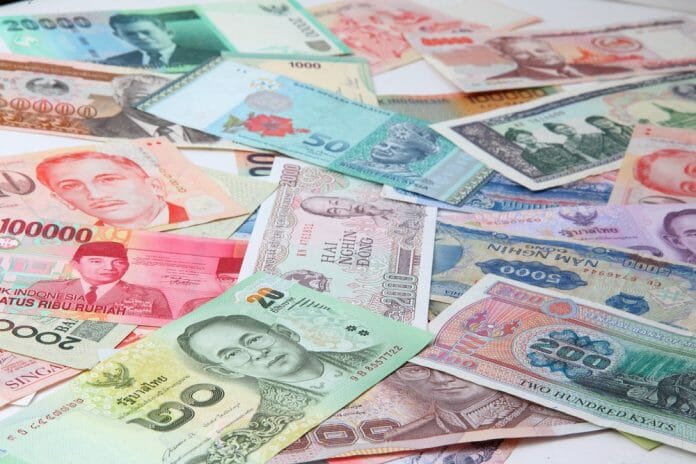Asian currencies came under selling pressure and traded near their lowest levels for the year on Wednesday as higher interest rates both at home and abroad have started weighing on regional economies.
The Japanese yen, South Korean won and Thai baht all recently slumped to their lowest levels against the dollar this year. Their weakness comes as the U.S. central bank maintained hawkish rhetoric, raising the prospects of further rate hikes and widening the rate differentials between U.S. and Asian economies.
The yen remains above 149 yen per dollar, near the 11-month low recorded on Tuesday. The won fell to 1354.6 per dollar, while the baht was down to 36.5 — both a 10-month low since November 2022.
Like the Fed, many Asian central banks raised interest rates last year, but for much of 2023 they have kept rates mostly steady, hoping that earlier rate hikes were enough to tame the inflationary tide. The U.S. Federal Reserve also kept interest rates at a 22-year high on Sept. 20 but hinted at further rate hikes, expecting robust growth and employment for 2024 and 2025.
The yen was also hit by dovish comments from Bank of Japan Gov. Kazuo Ueda, who on Sept. 22 reiterated the bank’s commitment to ultra-easy monetary policy and doused speculation that the BOJ would shift to tightening as early as December.
The Japanese currency slipped to 149 against the dollar on Tuesday — the lowest since October 2022 — even as Japanese Finance Minister Shunichi Suzuki warned the same day that “excessive fluctuations are undesirable” and that “the Japanese currency authorities are in communication with their overseas counterparts.”
Market players shrugged off the comment, however, saying they did not detect signs of urgency in Suzuki’s remarks. “It will be just a matter of time before the dollar-yen rate tests 150,” Mizuho Securities analysts said in a research note. At that level, many market players anticipate a yen-buying intervention by the BOJ. “The yen’s downswing could accelerate if there is no intervention,” the analysts said.
Ueda’s dovish rhetoric reflected persistent uncertainty over outlook on the global economy. Some economists even expect Asian central banks to ease policy to support their economies. Last week, the Asian Development Bank lowered its 2023 growth forecast for developing Asia to 4.7% from 4.8% as high interest rates and China’s property crisis pose growing risks.
The Chinese yuan fell to 7.34 yuan per dollar earlier in September, the lowest since December 2007. The dollar now trades near this low at 7.30 yuan.
On Wednesday, Nomura economists said they maintain their view that the Bank of Korea will start cutting rates in January.
Economists at Capital Economics equally have a downbeat view of emerging Asia, according to Nikkei Asia.
“GDP growth across most of Emerging Asia has struggled over the past year and we expect growth to remain weak in the near term as tight monetary policy at home and subdued activity abroad weigh on demand,” they said.
Capital Economics expects Bank Indonesia will start cutting rates by the end of the year, and the Philippines and Thailand in the first quarter of 2024.









